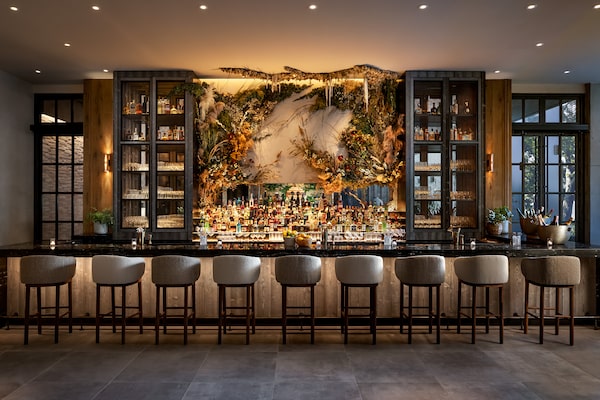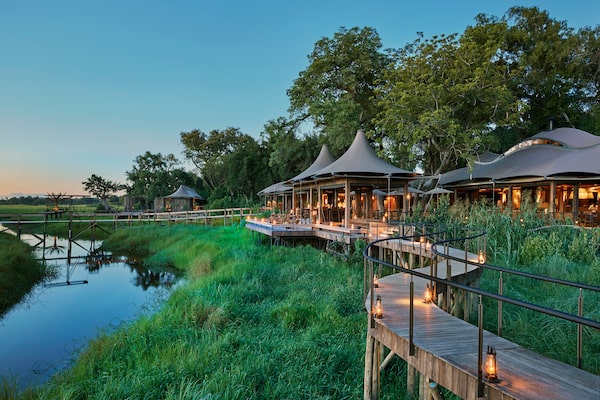When you land at Pearson airport, a driver in a Tesla is waiting to pick you up. As you drive downtown, you check in at the hotel on your phone, which activates the air conditioning in your room. You arrive at the hotel; the front entrance of the property is surrounded by granite boulders from Muskoka, driftwood, bushy eastern redbud trees and native grasses with bluish green leaves mimicking the Lake Ontario shoreline. But you are in downtown Toronto, in the busy King West neighbourhood.
Welcome to 1 Hotel Toronto, the city’s newest hotel that is attempting to prove you can achieve sustainability without skimping on luxury. Repurposing the building that was once the Thompson Hotel, sustainability here goes beyond encouraging guests to reuse towels and providing tote bags in every room – although it does those things, too. Sustainability is entrenched in the ethos of 1 Hotel, and seemingly every detail is accounted for.

In the Willow House suite, a plush sofa and armchairs from New York-based interior design firm Rockwell Group.Brandon Barre Photography/Handout
The 112 rooms, which start at around $500 a night, encapsulate the luxurious-meets-ecoconscious philosophy. In the Willow House suite, a plush sofa and armchairs from New York-based interior design firm Rockwell Group are paired with a large harvest table and stools made by Just Be Woodsy, a Toronto-based company that removes city trees flagged to be cut down and turns them into modern furniture pieces. Guests can get fresh towels and linens every day – but housekeeping staff also have a water-based sanitizer that refreshes rumpled sheets and cleans makeup-stained towels without a full wash.
There are no plastic water bottles – instead, you’ll find reusable water vessels and glasses made from recycled wine bottles, ready to be filled with filtered tap water. And each room is equipped with a Nespresso coffee machine, which might feel like a surprising choice for a hotel that forbids single-use plastic, but Corinne Hanson, 1 Hotels’ corporate director of sustainability, says it actually requires less water per cup than a regular coffee maker, and the aluminum pods get recycled. Plus, it’s the most convenient for guests. Research confirms it: A study from the University of Bath compared different methods of making coffee, considering steps such as growing the beans and waste produced, and found that coffee pods were the second most sustainable option, behind instant coffee.
The most impressive feat is 1 Kitchen, the hotel’s zero-waste restaurant. The owners have invested in a robust recycling program and use an on-site composter for leftover food scraps. After six weeks in the composter, it’s ready to be added to the vegetable garden beds in the street-level pavilion. Those gardens also provide fresh herbs such as cilantro, sage and basil for 1 Kitchen dishes, and edible flowers for cocktail garnishes. Around 95 per cent of 1 Kitchen’s ingredients are from small, local producers sourced within 100 kilometres, which allows staff to order small quantities of fruits, vegetables and other ingredients so they’re never stuck with excess. “In [the hotel] industry, food waste makes up around 47 per cent of the total waste we throw away,” says Todd Orlich, 1 Hotel Toronto’s managing director. “We think in the first year we’re open, we’ll be able to divert 20 tons from landfills, which is a little more than a football stadium.”

The upscale Tulum-inspired restaurant and bar Casa Madera will open in the fall, as well as the rooftop pool and lounge, Harriet's Rooftop.Brandon Barre Photography/Handout
In the fall, the upscale Tulum-inspired restaurant and bar Casa Madera will open, as well as the rooftop pool and lounge, Harriet’s Rooftop. Casa Madera, which is helmed by chef Olivier Le Calvez, will be nearly zero-waste, too.
These details illustrate the plethora of considerations that arise when operating an ecoconscious hotel. In an industry that’s notoriously wasteful – where tiny bottles of shampoo, starchy towels and sprawling buffet breakfasts are the norm – what kind of role can the hotel even have in sustainability?
“Hotels have a responsibility to do more,” says Sonya Graci, an associate professor in hospitality and tourism management at Ryerson University in Toronto. “When we think about climate change, it’s not just the amount of energy used [at the hotel], it’s also the energy needed for production and procurement of food. Are they purchasing the cheapest options? Shipping in fruit from South America may be less costly, but from an environmental perspective, it’s extremely costly.”
Graci points to a 2018 study by researchers at the University of Sydney, which found that global tourism accounts for around 8 per cent of the world’s global greenhouse gas emissions. And according to the Sustainable Hospitality Alliance, an organization comprised of hospitality companies focused on reducing carbon emissions within the sector, hotels specifically make up around 1 per cent of global carbon emissions – and that’s predicted to increase. “The impact of hotels was a lot greater than we thought,” Graci says.
1 Hotels, which has five locations in the United States, with plans to open more in Cabo San Lucas, London, Paris, Melbourne, Crete and Hanalei Bay, Hawaii, has big picture targets, such as transitioning to more renewable energy sources at all their properties and continuing to limit their water consumption. But the impact is also showing guests that luxurious travel experiences can go hand in hand with being environmentally responsible.
“The environmental movement has really tried to get people to care about [the environment] by tethering your understanding of your role in society and the planet’s needs,” Hanson says. “When you’re travelling, you don’t have that deep connection to your community in place, so you don’t necessarily feel ownership. I think the wider responsibility of the hospitality industry is to help guests feel a clear sense of place so they can understand their impact.”
Three other luxury hotels putting sustainability front and centre

With tourism limited in the area, Xigera works closely with the local community and Botswana’s department of wildlife and national parks to protect the wetlands.Handout
Xigera Safari Lodge, Botswana The new Xigera Safari Lodge is situated in the Okavango Delta wetland, home to some of the world’s most endangered species, including the cheetah, white rhinoceros, African wild dog and lion. With tourism limited in the area, Xigera works closely with the local community and Botswana’s department of wildlife and national parks to protect the wetlands. It maintains a small carbon footprint with its Tesla solar-hybrid system, which supplies around 95 per cent of the required energy for the property, saving the lodge around 73,000 litres of diesel and preventing around 421,000 tons of carbon emissions annually. The lodge is also building a solar farm to power its safari vehicles, while the hot water is provided via energy-saving thermodynamic geysers.

Since opening in 2009, Playa Viva has invested in reforestation projects to meet its carbon sequestration goals.Kevin Steele/Handout
Playa Viva, Mexico This off-grid resort in Zihuatanejo, Mexico, is a leader in regenerative travel, a concept that focuses on restoring and maintaining the surrounding ecosystem and relationships with local communities. Since opening in 2009, Playa Viva has invested in reforestation projects to meet its carbon sequestration goals, built an organic farm that grows nutrient-dense crops for both the resort and local residents, and founded a turtle sanctuary to help protect thousands of turtles from predators and poachers. The sanctuary has safely released nearly half a million baby sea turtles – guests are welcome to join the sanctuary volunteers to search the beach at night for eggs to bring back to the incubator until they hatch and are ready to be released into the ocean.

Six Senses Ibiza works with local partners such as the Ibiza Preservation Fund to help minimize its ecological impact.Handout
Six Senses Ibiza, Spain The first BREEAM-certified resort in the Balearics, the newly opened Six Senses Ibiza has its own organic farm, which produces the majority of the ingredients used at the resort’s four restaurants. Food waste from the resort will be turned into compost and fed back into the farm’s soil. The resort also works with local partners such as the Ibiza Preservation Fund to help minimize its ecological impact and sustain the biodiversity on the island.
Keep up to date with the weekly Sightseer newsletter. Sign up today.
Editor’s note: (Aug. 4) An earlier version of this story misnamed Harriet's Rooftop bar. This version has been updated.